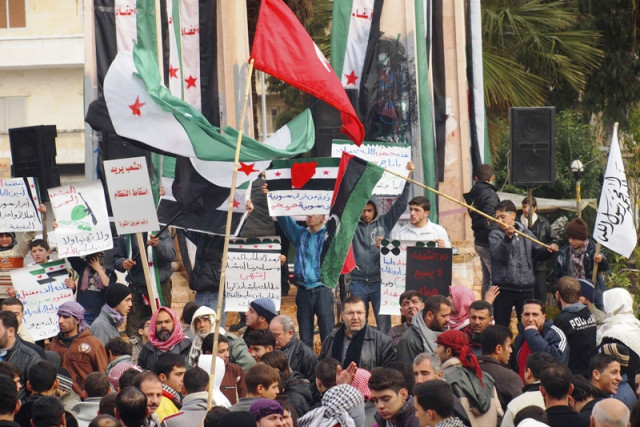Coping with the Syrian crisis
The crisis may not be followed by democracy because those who are in revolt have no idea of it.

The philosophy of crackdowns — and Pakistan should pay heed to this — is predicated on speed, followed by concessions. This has not happened and President Assad is paying the price for not wrapping it up in short order. Instead of shaping his strategy realistically, he is accusing the ‘enemies of Syria’ — here, too, Pakistan should pay careful attention — who are intent on destroying the country in pursuit of a general policy of taming in the Middle East in favour of Israel. The matter has gone to the UN Security council where China and Russia have stopped a reprimanding resolution through their veto.
The media in Pakistan may have taken a myopic view while criticising Pakistan’s ‘yes’ vote at the Security Council while ‘friend China’ was vetoing it. In Pakistani eyes it meant doing to Syria what the world did to Libya: condemnation by the Arab League, followed by a UN resolution, a machination in which rascally America stood aside and saw Muammar Gaddafi being slaughtered. But in the case of Syria, two big power vetoes prevented that from happening. But has that pacified Syria and resolved its fundamentally humanitarian crisis? President Assad has promised a new constitution for which a referendum is scheduled for today. A sop to the Russian and Chinese diplomats watching him, it is hardly going to be credible although the new constitution promises political parties and elections. What Pakistan accepts — while correctly voting for the Security Council resolution — is the stance adopted by the Arab League whose repeated requests for observers had been waved aside by Damascus. Pakistan also took into account the growing impatience of neighbouring Turkey receiving a growing runaway population from Syria. The truth is that Syria’s attitude is untenable and both Russia and China are becoming aware of this fact and are distancing themselves from the Assad regime diplomatically. Syria has been ousted from the Arab League, and its 22 members are about to make sure that all of them sever diplomatic ties to Damascus.
Pakistan’s foreign policy in the Middle East is informed by two institutional considerations: links with the Arab League when the matter is purely Arab in nature; and the OIC, when the framework embraces the entire Muslim world. There are arguments on both sides that must, however, be noted. Muslim states are being challenged from the inside, but the agitation may be instigated from without. The Islamic world, by and large, supported the Arab Spring — together with the Western world — thinking democracy will benefit states like Egypt and Tunisia languishing under corrupt dictatorships. Here, the West should have eschewed support because these dictatorships were seen to be Western pawns, but it did not. However, when Nato came in — via the Arab League and UN — to support the popular uprising in Libya, the Islamic street changed its mind.
There was some reasoning behind this volte-face which must be considered. When a similar uprising took place in Bahrain, it was suppressed with neighbourhood military support. The inner dynamic was eye-opening: in Syria the majority which is Sunni, is rising up against an Alawite-Shia minority; in Bahrain it was the majority, which is Shia, revolting against a Sunni minority regime. The Syrian crisis is predictably creeping towards the finale of Alawite rule in Damascus. It may not be followed by democracy because those who are in revolt have no idea of it, as we saw in Iraq, Egypt, Tunisia and Libya.
Published in The Express Tribune, February 27th, 2012.















COMMENTS
Comments are moderated and generally will be posted if they are on-topic and not abusive.
For more information, please see our Comments FAQ